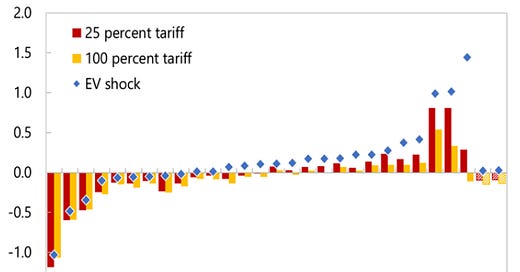Europe has experienced somewhat of a Chinese EV shock. Chinese EVs have conquered the European market because they are technologically more advanced than the European competition, yet typically 20% to 30% cheaper than what European manufacturers have to offer. And now that a trade war is on between China and the US, these cars may become even cheaper as Chinese exporters may decide to dump their goods on europe. The EU has reacted with tariffs on Chinese manufacturers, which is a bad idea if you ask me.
Philippe Wingeder and his collaborators have tried to assess the economic impact of the Chinese ‘EV shock’ and the European response in the form of tariffs.
Of course, the rising market share of Chinese EVs comes at the cost of European manufacturers (in particular German ones) and thus hits the countries in the EU that have the highest exposure to the automotive industry. The chart below shows that these are mostly the central European countries that are the main hubs for car manufacturing and automotive supply firms like Slovakia, Czechia, and Hungary together with Germany.
GDP impact of EV shock and tariffs
Source: Wingeder et al. (2024)
Germany is a large economy that can digest the Chinese EV shock quite well, with its GDP dropping by about 0.1% to 0.2% in the long run vs. a world where Chinese EVs are absent. Hungary and Slovakia, meanwhile, would see their GDP drop by 0.5% and 1.0%, respectively. They feel the EV shock much more than the rest of Europe.
But as you can see, harsh tariffs are not the answer. Most countries will see a larger drop in GDP due to European tariffs on Chinese imports than without tariffs. While tariffs protect some local jobs in automotive manufacturing, they also reduce competitiveness in the European automotive market. This reduces investment and productivity growth, leading to lower growth in the medium term. Plus, tariffs make Chinese cars more expensive and force European consumers to buy other cars that are more expensive than Chinese EVs without tariffs would have been. In other words, European consumers pay for tariffs on Chinese EVs directly or indirectly. And that reduces consumption of other goods and services and thus economic output.
It's always the same story, tariffs protect jobs in some part o the economy at the expense of everybody else having to pay more and distributing the pain across all other sectors.
How to mitigate the Chinese EV shock then? Well, offer the Chinese manufacturers incentives to invest in Europe. Offer them tax breaks or government grants to build battery factories or car assemblies in the countries that are hardest hit by the EV shock.
The second chart shows what would happen if China expanded its investments in EU countries proportional to where cars are produced today. This reduces the size of the EV shock, though it won’t eliminate it simply because it is highly unlikely that Chinese companies will produce all their EVs in Europe. But the bigger the incentives for Chinese manufacturers to come to Europe, the better. Instead of using the tariff stick, it would be better to use carrots to deal with the EV shock.
GDP impact of EV shock and increased Chinese investments in Europe
Source: Wingeder et al. (2024)
Oh, and lest I forget it, European manufacturers should get their act together and invest more in EV technology to catch up with the more advanced Chinese manufacturers. The Chinese EV shock is a European problem created by the hybris and lethargy of European car manufacturers.






Thanks for the comments and the article! I had no idea that industrial policy was so ubiquitous around the world.
China is in the Electric Vehicle business, not the car business. Both are modes of transportation, but they are different entities. Until car manufacturers recognize they are in the horse-and-buggy business, they are toast.